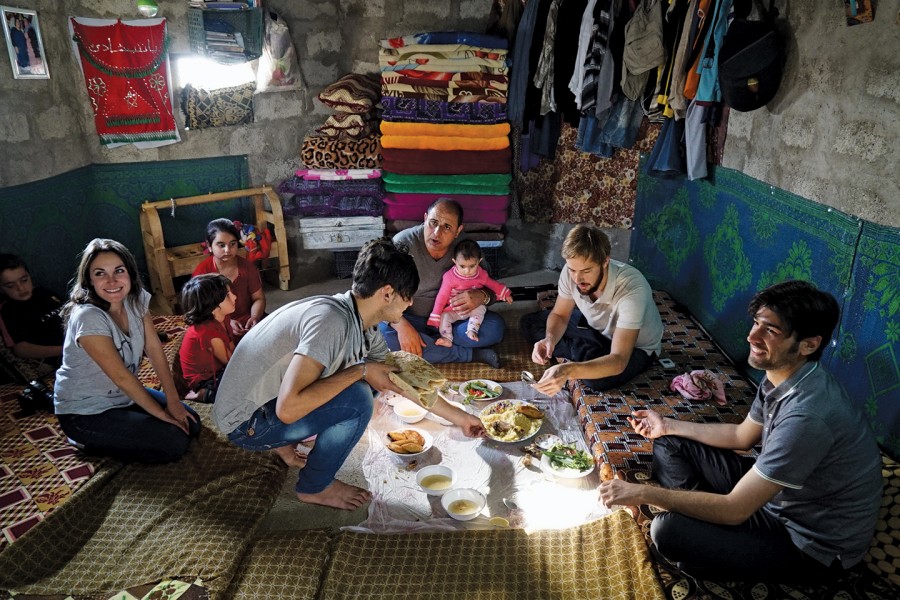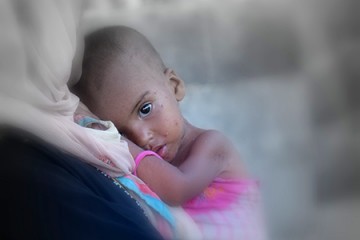The life of a man named Barakat changed irrevocably just before breakfast. On the morning of August 3, 2014, the Yazidi man learned from a messenger that a convoy of ISIS militia in armored trucks and Humvees was en route to his northern Iraqi town of Khana Sor. A bookstore owner and former Arabic interpreter for U.S. forces following the 2003 invasion of Iraq, Barakat—whose full name is withheld to protect his identity—knew his wife and two daughters were in danger.
Hastily, they piled into a car and drove northeast toward Iraq's Kurdistan Region. Along the way, Barakat's car was shot at and later broke down. His family happened upon a semi-trailer ice cream truck, already filled with dozens of fellow Yazidis fleeing the region, and eventually reached safety. They were among the fortunate. In Barakat's home district of Sinjar, ISIS fighters would slaughter an estimated 3,000 Yazidi civilians during a span of days now known as the Sinjar massacre.
Video credit: Music in Exile
Two years later, in a small, unfinished building near Mosul, Barakat sat on the floor of his living room to play on a tanbur, a traditional Kurdish stringed instrument, a song he wrote in memory of the children who died during those August days in 2014. Cameras rolled. Audio equipment recorded the music. Sasha Ingber, A&S '13 (MA), took notes. Ingber had flown some 6,000 miles to record a moment just like this. In the summer of 2016, she co-founded Music in Exile, a nonprofit that seeks to document the songs and stories of the displaced. She and co-founder Alex Ebsary want to preserve the cultural heritage of communities irreparably damaged by war, sectarian violence, and regional instability. They also want to humanize refugees such as Barakat, who live during a period of humanitarian crisis not seen since World War II.
"He told us, 'Nobody can steal this [song] from me,'" says Ingber, recalling the day. "He said, 'Our enemies have destroyed so much of our culture. I wrote this song and memorized hundreds of others, which they can never take away.'"
To date, Ingber, Ebsary, and a cameraperson have traveled to resettled communities and camps for the displaced in Iraq, Nebraska, and Ontario, Canada. They seek musicians, from the novice to the professional, and produce field recordings, photographs, videos, and stories for the organization's website.
"This isn't some form of American Idol," Ingber says. "We're just letting people share their stories and their humanity through this lens of music. For some, music is an escape from the pain and sadness and worry. For others, it's a chance to communicate what happened to them. The music is also a way to ensure a part of your identity is not taken away from you, even though you've had to flee your home."
Ingber first met Ebsary at a Metro stop in Washington, D.C. A Connecticut native who had spent some time living abroad after studying film, television, and radio at the University of Wisconsin–Madison, Ingber had moved to D.C. to study writing at Johns Hopkins and pursue a career in journalism. Ebsary had spent three years living in Turkey and the Kurdistan Region of Iraq as a teacher. When they met, he had just begun working at the Kurdistan Regional Government office in D.C. The two quickly hit it off, and Ebsary shared his concept for recording displaced musicians. The idea had come to him after hearing a Syrian play a saz—a stringed instrument, which in this case was missing some strings—during a trip to Domiz refugee camp in 2013. He wondered how he could share the music of these people with the wider world. "That chance meeting [with Alex] literally changed the direction of my life," says Ingber, now a breaking news reporter for NPR. "He was interested in the music side, and I was interested in the stories of these people."
Supported mostly by individual donations, they work on a tight budget. They often share a room with the cameraperson. They rent cars and hire a relatively inexpensive interpreter to help them with the language barrier.
Ingber's interest in music and refugees stems from a personal place. Her grandfather was held at Buchenwald, a Nazi concentration camp, during World War II. An aspiring opera singer and German-born Jew, he sang in the railway cars that delivered his family and friends to the camp, where he sang for his fellow prisoners and even his captors. "My grandfather told us he felt his singing helped people find some comfort, and a sense of familiarity even in this terrifying moment, and in a place where everyone was dehumanized," she says. "My grandfather died in 1995, when I was 12. I just feel that it would have been nice to talk with him as an adult about what he experienced and how he moved forward. We never got to do that, and I think about him a lot."
In the future, Ingber and Ebsary want to post more video content, have more of the songs translated, and feature more women, who have been underrepresented at the communities they've visited. This fall, they plan to travel to Bangladesh, currently home to more than 700,000 Muslim Rohingya refugees who have fled Myanmar since August 2017 because of religious persecution. "This is an important trip for us," Ingber says. "The Rohingya crisis has been going on for decades. Some say they are the most persecuted people in the world, but their story really hasn't been told, and certainly not from the angle we hope to tell it."
Posted in Arts+Culture, Politics+Society
Tagged music, syria, culture, refugee crisis










